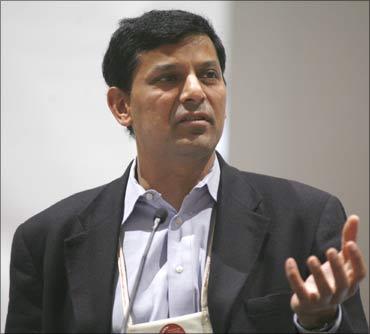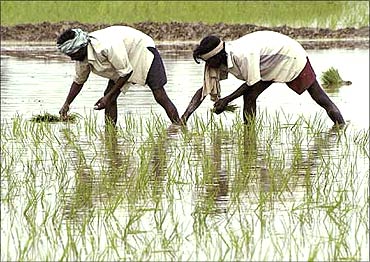 | « Back to article | Print this article |
India's root problem? Labour laws
The answer to the problems of high inflation and slowing growth, and low farm incomes, would lie in addressing the basic reforms that India is still to attempt -- like labour laws, says T N Ninan.
Delivering the third Business Standard lecture on Thursday night, Raghuram Rajan provided an interesting insight into the reason for high inflation in India.
The professor of finance at Chicago, who is also an adviser to the prime minister, argued that productivity growth in Indian agriculture had been poor, so rural incomes were not growing fast enough.
In its effort to deal with this, the government was pumping subsidies and income transfers into the countryside, to put money in people's pockets -- which the recipients were spending.
Since this expenditure was not matched by productivity growth, it was causing inflation.
Click NEXT to read on . . .
India's root problem? Labour laws
The argument brought to mind the subtle insight that Dr Rajan offered into one of the causes of the financial crisis in the United States in 2007-08.
Inequality had been growing in the United States, he said in his award-winning book Fault Lines, published last year.
With incomes in the lower deciles virtually stagnant, politicians responded by trying to meet one of the basic needs of the poor, namely housing.
They allowed financial innovations that made it possible to give housing loans to those who would not ordinarily qualify.
Click NEXT to read on . . .
India's root problem? Labour laws
Thus was born the sub-prime housing market which, with the help of Wall Street types, ballooned and then morphed into the mega-financial crisis that brought economies on both sides of the Atlantic to a standstill.
Both arguments by Dr Rajan trace a financial problem to non-financial causes rooted in the real economy.
It is a line of thought that is worth staying with. If you look for the root cause of the power sector's problems (high losses, disincentive for investors), it boils down to the virtually free electricity provided to farmers.
That can't be corrected because farmers don't earn enough to be able to pay a higher electricity tariff.
Click NEXT to read on . . .
India's root problem? Labour laws
And there is a limit beyond which it becomes impossible for other users to cross-subsidise power to farmers; high electricity tariffs are already a burden for exporters who compete against rivals in countries that enjoy lower power tariffs.
So you can't fix the power sector's problems without fixing agriculture. That argument can be taken a step further: Land revenue has virtually disappeared as a source of money for state governments -- farmers can't be taxed because they don't earn enough.
Irrigation charges cannot be levied at any reasonable level, for the same reason. Fertiliser prices cannot be raised, diesel prices have to be kept down because farmers use it for their pump-sets, and so on.
The bald truth is that half of India's workforce toils in the fields to generate one-sixth of GDP. Since the other half produces the remaining five-sixths, non-agricultural incomes are typically five times agricultural incomes.
Click NEXT to read on . . .
India's root problem? Labour laws
The way to even out the imbalance is to get people off the land, and into non-agricultural occupations. But urbanisation and the growth of non-agricultural employment have been slow in India, an important reason being the stifling of industries that can provide entry-level, low-value work.
China showed the way by promoting Township and Village Enterprises (TVEs), and encouraging through them the manufacture and export of simple products like toys and shoes.
Rajiv Gandhi, on his path-breaking visit to China in 1988, visited one such TVE outside Shanghai which was making and exporting tricycles of a basic kind.
Click NEXT to read on . . .
India's root problem? Labour laws
India missed the bus that China caught, but it can still catch some others -- like travel and tourism.
The answer to the problems of high inflation and slowing growth, and low farm incomes, would lie in addressing the basic reforms that India is still to attempt -- like labour laws.
Instead, we have a Food Security Bill that will create irrational incentives which end up threatening agriculture itself. Talk of committing hara-kiri.






